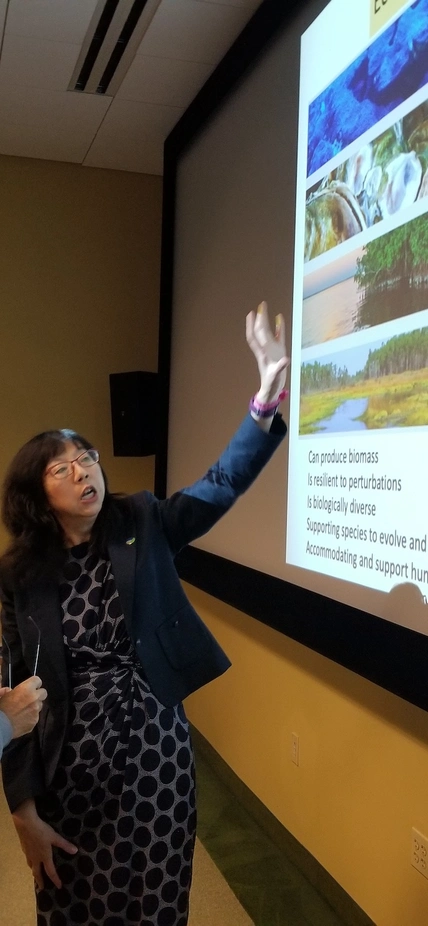On Thursday, November 7, 2019, more than 150 neighbors of Carnegie’s Broad Branch Road campus gathered to hear Dr. Yixian Zheng deliver her Neighborhood lecture: The Biology of Corals: Basic Research and Environmental Health. Dr. Zheng is the Director of Carnegie’s Embryology Department situated on the campus of John Hopkins University. Broad Branch Road’s neighborhood lectures have provided an opportunity to get up close and personal with Carnegie scientists since Fall 2006.
The talk was a change of pace from the campus’ normal astronomical and planetary science programming to focus on the complex biological systems studied by the Department of Embryology. Guests learned about the basics of biological research and the history of Carnegie Science’s work on this subject before Zheng moved on to discussing her lab’s work.
“You have all kinds of tools in drosophila” stated Zheng discussing why biologists use well-studied model organisms, like the common fruit fly (Drosophila melanogaster), to understand more complicated biological systems like the ones in human bodies and coral reefs.
The presentation honed in on a process called endosymbiosis, in which one organism lives inside of another to the benefit of both. Zheng explained that corals have an endosymbiotic relationship with a type of algae that lives inside of them. Besides being responsible for the bright colors associated with coral, the algae photosynthesizes sugars which it then shares with the coral while the coral provides a safe environment for the algae to do its work. When a coral gets stressed, most commonly by high sea temperatures, it will eject its algae and die soon after.
“When coral loses the symbiotic algae that they host, they are bleached,” stated Zheng.
Coral is at bleaching risk around the world due to climate change. The Carnegie Embryology department is working to identify key genes that regulate algal expulsion. Zheng concluded the lecture by examining how understanding these mechanisms in corals that are resilient to temperature change could allow researchers to come up with solutions to save the less resilient corals.
“If we can understand humans to save a life, hopefully, we can understand and save this system as well,” stated Zheng.
